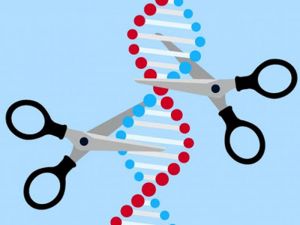Edición genética revolucionaria
“Las herramientas CRISPR de edición genética han demostrado su versatilidad en numerosas ocasiones, en los apenas siete años que las llevamos usando los investigadores, tras los miles de millones de años que llevan las bacterias usándolas para defenderse de los virus que las atacan”, explica Montoliu, investigador principal del proyecto junto a Dolores Rodríguez Aguirre (CNB-CSIC), Miguel Ángel Moreno Mateos (CABD-CSIC-UPO) y Almudena Fernández, CIBER-ISCIII. “Hay muchos tipos de herramientas CRISPR. La mayoría son capaces de cortar el ADN a través de una proteína que actúa como una tijera, llamada Cas, que corta el genoma de cualquier especie simplemente guiada por una pequeña molécula de ARN, el ácido nucleico intermediario que habitualmente traslada la información genética desde el núcleo al citoplasma de la célula, donde se producirán las proteínas”, indica Montoliu. “Por eso se las conoce como tijeras programables. Porque cortan el ADN en sitios específicos, gracias a la guía de ARN, que podemos cambiar para que corte en otro sitio del genoma”, añade.
Tijeras para cortar el corazón del coronavirus
Hace unos pocos años se descubrió un nuevo tipo de proteínas Cas que eran capaces de cortar directamente el ARN, y no el ADN. Y además lo hacían de una manera muy específica. Solamente cortaban aquel ARN que les indicaba, de nuevo, otra pequeña molécula de ARN complementario, que volvía a actuar como guía. A esta proteína se la denominó Cas13d.
“Este proyecto persigue un objetivo aparentemente sencillo”, señala Montoliu. “Si la variante CRISPR llamada Cas13d puede cortar moléculas de ARN de forma específica, y si el genoma del coronavirus SARS-CoV-2, causante de la COVID-19, es una molécula de ARN: ¿Por qué no “programar” una de estas proteínas Cas13d, con una guía de ARN complementaria al genoma del coronavirus, para que lo corte y promueva su destrucción por parte de la célula?”.
Equipo multidisciplinar
Montoliu lo resumen con una imagen clara: “Se trata pues de atacar directamente al corazón del coronavirus, a su genoma de ARN, para destruirlo”. Para llevarlo a cabo, el proyecto agrupa a cuatro investigadores de perfiles diversos, pero complementarios: Dolores Rodríguez, viróloga experta en el manejo y caracterización de diferentes tipos de virus; Miguel Ángel Moreno Mateos, biólogo del desarrollo, experto en las nuevas proteínas Cas y en sistemas CRISPR in vivo; y Almudena Fernández y Lluís Montoliu, genetistas, expertos en el uso de las herramientas CRISPR de edición genética para la generación de modelos animales de enfermedades raras.
“Durante el proyecto diseñaremos los reactivos CRISPR-Cas13d en el CABD, donde se evaluará primero su funcionalidad y su no toxicidad usando embriones de pez cebra. Posteriormente estos reactivos se testarán en el CNB-CSIC, utilizando varios virus de ARN, similares al coronavirus, pero menos peligrosos que el SARS-CoV-2, para establecer las condiciones óptimas de ataque y destrucción de los virus. Finalmente, con el protocolo ya establecido, probaremos nuestra estrategia en células infectadas con el coronavirus actual, causante de la Covid-19, en un laboratorio con la bioseguridad adecuada”.
“Si nuestra estrategia terapéutica funciona, los siguientes pasos serían probarla en un modelo animal, en ratones susceptibles de ser infectados con el coronavirus, y, finalmente, si los resultados acompañan, en ensayos clínicos con pacientes”, concluye Montoliu.






